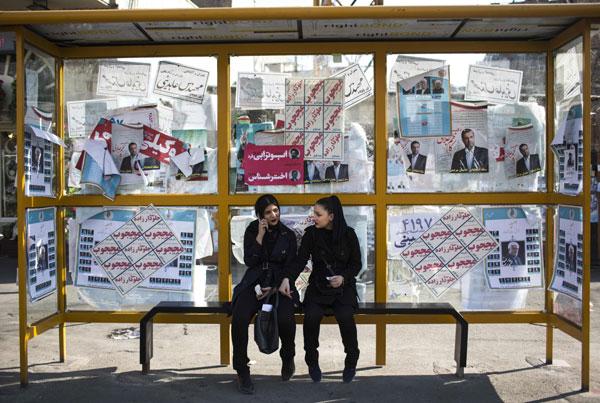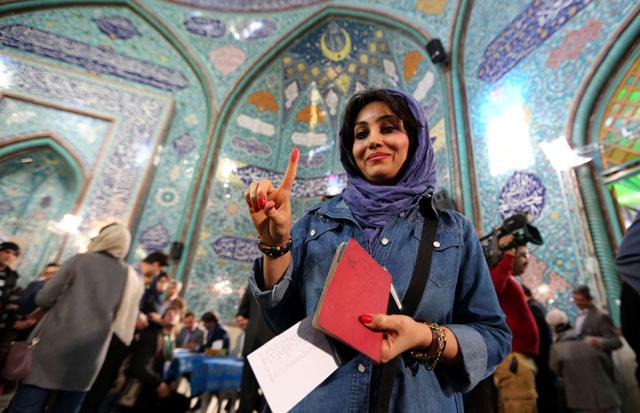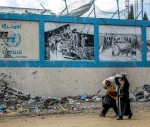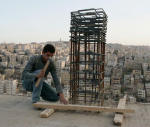You are here
Moderates test hardliners’ grip on power in Iran vote
By Reuters - Feb 25,2016 - Last updated at Feb 25,2016

Iranian women sit at a bus station decorated with electoral posters for the upcoming parliamentary elections in downtown Tehran, on Thursday (AFP photo)
TEHRAN — Friday's vote for Iran's parliament and the Assembly of Experts, the body that will pick the next supreme leader, has assumed an importance well beyond the perennial battles between hardliners entrenched in power and reformists seeking to unseat them.
These are the first elections since Tehran reached an accord with major powers to curb its nuclear programme, leading to the removal of most of the punitive international sanctions that have strangled the economy over the past decade.
The breakthrough took place under pragmatic President Hassan Rouhani, who sees it as a springboard for Iran to reintegrate into the international community and return to world markets. But hardline opponents are determined to prevent it leading to any liberalisation of the Islamic system through the ballot box.
These electoral contests are seen by some analysts as a make-or-break moment that could shape the future for the next generation, in a country where nearly 60 per cent of the 80 million-strong population is under 30.
The outcome could be skewed by the disqualification of many pro-reform candidates by an unelected clerical Guardian Council that reports directly to Supreme Leader Ayatollah Ali Khamenei.
The stakes are high for all factions, since the outcome may well determine whether Rouhani has a mandate to push ahead with long-promised political, social and economic reforms, as well as influencing his chances of re-election in 2017.
In the final days of campaigning, the fight turned vicious.
Reflecting an abiding mistrust in Rouhani’s overtures to the West, Khamenei accused the West of plotting to influence the vote and said he was sure Iranians would vote in favour of keeping Iran’s anti-Western stance.
Rouhani, whose allies have come under growing pressure in the election campaign from hardliners who accuse them of links to Western powers, has denied such accusations, calling them an insult to the intelligence of Iranians.
Moderate allies of Rouhani, buoyed by the nuclear deal, are hoping to win back positions they lost over the past decade. But the filtering out of candidates and the slow pace of economic improvement have added to popular disillusion over Rouhani’s stalled reforms, leaving them facing an uphill battle.
Under the thumb
The preliminaries to both contests underlined that elected politicians are ultimately under the thumb of clerics, Islamic jurists and their opaque institutions, with the supreme leader at their apex.
Even if his hardline allies were to lose the parliamentary race to their moderate rivals, Khamenei will continue to hold ultimate authority, while presidents and lawmakers come and go.
“Let’s presume we have a reformist government that has a majority, I don’t think they will make a big difference. The supreme leader and the Revolutionary Guards set the tone, and the limit and determine the overall direction of the country,” said one Tehran analyst who requested anonymity.
“We shouldn’t have high expectations. The conservatives have the levers of power. The media, the military, the intelligence, the actual financial resources are in their hands. It is a dual system and the other side is still very powerful,” he added.
The last time reformers won the upper hand in parliament, under former president Mohammad Khatami, the Guardian Council vetoed several laws it passed as contrary to Islamic principles.
Last year’s nuclear accord led to last month’s lifting of crippling sanctions, even though important residual sanctions relating to Iran’s international conduct remain in place.
Iran, which has the world’s second largest gas reserves, a diversified manufacturing base and educated workforce, is seen by global investors as a huge emerging market opportunity, in everything from cars to airplanes and railways to retail.
Hardliners alarmed
For ordinary Iranians, the prospect of this kind of investment holds out the promise of a return to economic growth, better living standards and more jobs in the long run.
An opening to the world of this magnitude — and Rouhani’s popularity — have alarmed hardline allies of Khamenei, who fear losing control of the pace of change, as well as inroads into the lucrative economic interests they built up under sanctions.
The Islamic Revolutionary Guard Corps, for example, is not just Iran’s praetorian guard but a corporate empire, with vast holdings in from banking to construction and manufacturing.
The guards are still under sanctions for alleged support for terrorism. All this has exacerbated political infighting within Iran’s complex power structures.
The Guardian Council barred thousands of moderates from standing, including Hassan Khomeini, the grandson of the Islamic Republic’s founder, Ayatollah Ruhollah Khomeini.
The younger Khomeini, a 43-year-old mid-ranking cleric, had sought to enter the Assembly of Experts as a standard-bearer for moderates with credibility among conservatives. He was told he lacked the necessary religious credentials.
One of the most crucial contests is in Tehran, where more than 1,000 candidates are competing for just 30 seats. The reformists’ list there is led by Mohammad Reza Aref, a Stanford-educated former presidential candidate and minister, who served as vice president to the reformist Khatami in 2001-2005.
The conservatives’ front-runner is Gholamali Haddad Adel, who has been a member of parliament since 2000 and was its speaker in 2004-9. He is also an adviser to Khamenei and his daughter is married to the supreme leader’s influential son Mojtaba.
Out of the estimated 801 Islamic clerics who put themselves forward for the 88-member Assembly of Experts, only 166 were approved as candidates. Women were not allowed to stand for the assembly, which will eventually choose a successor to Khamenei.
Significant contest
Until now, the contest for this seat of clerical power was an unremarkable event, but not this time. Because of Khamenei’s health and age of 76, the new assembly members who serve an eight-year term are likely to choose his successor. The next leader could well be among those elected this week.
The reformists’ top candidate is former president Ayatollah Akbar Hashemi Rafsanjani, although he is now 81. He is among the founders of the Islamic Republic and was its president from 1989-1997. Nearly always at the centre of Iran’s intricate webs of power, he is famous for his pragmatism and political acumen.
In backing such a centrist arch-fixer, the reformists hope that in alliance with moderate conservatives they will be able to block the three main ultra-conservative leaders — Ahmad Jannati, Mohammad Yazdi and Mohammad Taghi Mesbah-Yazdi — from emerging as Khamenei’s successor.
Rafsanjani is also head of the Expediency Council, a body which mediates between the elected parliament and the appointed Guardian Council. But his power has waned in recent years, highlighted by the jailing of two of his children.
He fell out with Khamenei after backing the opposition Green Movement in the disputed 2009 presidential vote, and is now allied with the reformists. President Rouhani is number two on the reformist candidate list for the Assembly of Experts, just after Rafsanjani.
Khamenei, who backed the Guardian Council’s strict vetting, has repeatedly warned that Iran’s enemies have sought to use the elections to “infiltrate” its power structure. Yet for all his power, even he cannot curb debate about Iran’s future.
In the past, any debate about Khamenei’s possible successor was considered as undermining the supreme leader, but public discussion has gained momentum ahead of the elections.
This is hardly surprising given that the supreme leader has substantial influence, or constitutional authority, over the executive, legislative and judicial branches of government as well as the military and media.
Unresolved power struggle
Rafsanjani angered hardliners in December when he said the assembly would be open to choosing “a council of leaders if needed” instead of a single supreme leader who rules for life.
Under Iran’s constitution, a transitional “leadership council” is permitted until a supreme leader is selected by the assembly. But analysts said Rafsanjani advocated a permanent council, fiercely rejected by Khamenei’s hardline allies.
“The reformists won’t have a strong hand in the Assembly of Experts because Rafsanjani sent a bad signal that the assembly could challenge the leader,” Amir Mohebian, a conservative political strategist, told Reuters.
“They went on guard by disqualifying Khomeini. They sent a message: ‘We’re strong and don’t allow anybody to make changes in the assembly, that it’s not a place for politicians’ play, that it’s a key place for choosing a new leader’.”
Despite the sweeping disqualifications, reformists are competing fiercely, and trying to maximise their results by forming a coalition with pragmatists and offering a joint list of their favourite candidates in the capital and other cities.
The conservatives are taking no chances either. They are organising buses to transport voters from remote villages and cities to Tehran, providing them with accommodation and food to cast their ballot for their candidates.
Ex-president Khatami, the reformist figurehead who is banned from appearing in official media, posted a video message this week urging followers to vote for the reformist camp, which has chosen “Hope” as its campaign slogan.
“The higher the turnout of eligible voters, the closer the result will be to the demands of the people,” Khatami said, referring to past polls when reformists won more seats on a high turnout.
Divided youth
The outcome of the parliamentary vote will have no big impact on foreign policy. But it will boost the victorious faction’s influence in next year’s presidential election.
A parliament friendly to Rouhani could strengthen his hand to push through economic reforms to open the country to foreign trade and investment. It can also help the government carry out a political agenda aimed at expanding social and economic liberties, as promised during his 2013 election campaign.
The polarisation gripping the country had hit young people, many of whom are voting for the first time.
While some said they would vote for reformists, because they seek change and want to block the hardliners, others planned to vote for conservatives out of loyalty to Khamenei. Some said they would boycott because their vote won’t make any difference.
“I won’t waste my time and vote as nothing will change because the conservatives have the power in their hands,” said Area Behfuruz, 18, a first-year student of dentistry at Tehran University.
Sahar, 26, an art student, said: “I don’t think fundamental change will happen at all. Those running the country are the same. The few times we had some change, we had the hardliners blocking them. Even if the reformists gain power now they will be blocked by the hardliners.”
Bahar, 22, a student of medical genetics, said: “I will vote for the reformists because I want change. I want a country that is more in relation with the world, not so isolated. We have a very rich country with a young population, I want a government that invests in its people, in youth and improves their lot.”
With the future direction of the country so much in play after Iran’s international breakthrough on the nuclear deal, factional infighting and skirmishing of this kind is likely to continue long after this Friday’s twin elections.
“This is fundamentally a status quo political system which is not interested in real change,” said the Tehran analyst. “Change is very gradual, cosmetic. This election won’t usher a new era for Iran.”
Related Articles
TEHRAN — Iran’s Assembly of Experts chose another hardline cleric as its chief on Tuesday, keeping the powerful religious body in ultraconse
TEHRAN — President Hassan Rouhani won a resounding vote of support and his moderate allies made a strong showing in high-stakes elections th
TEHRAN — Iran's former president Mohammad Khatami and his predecessor have urged voters to back reformists and moderates in Friday elections

















